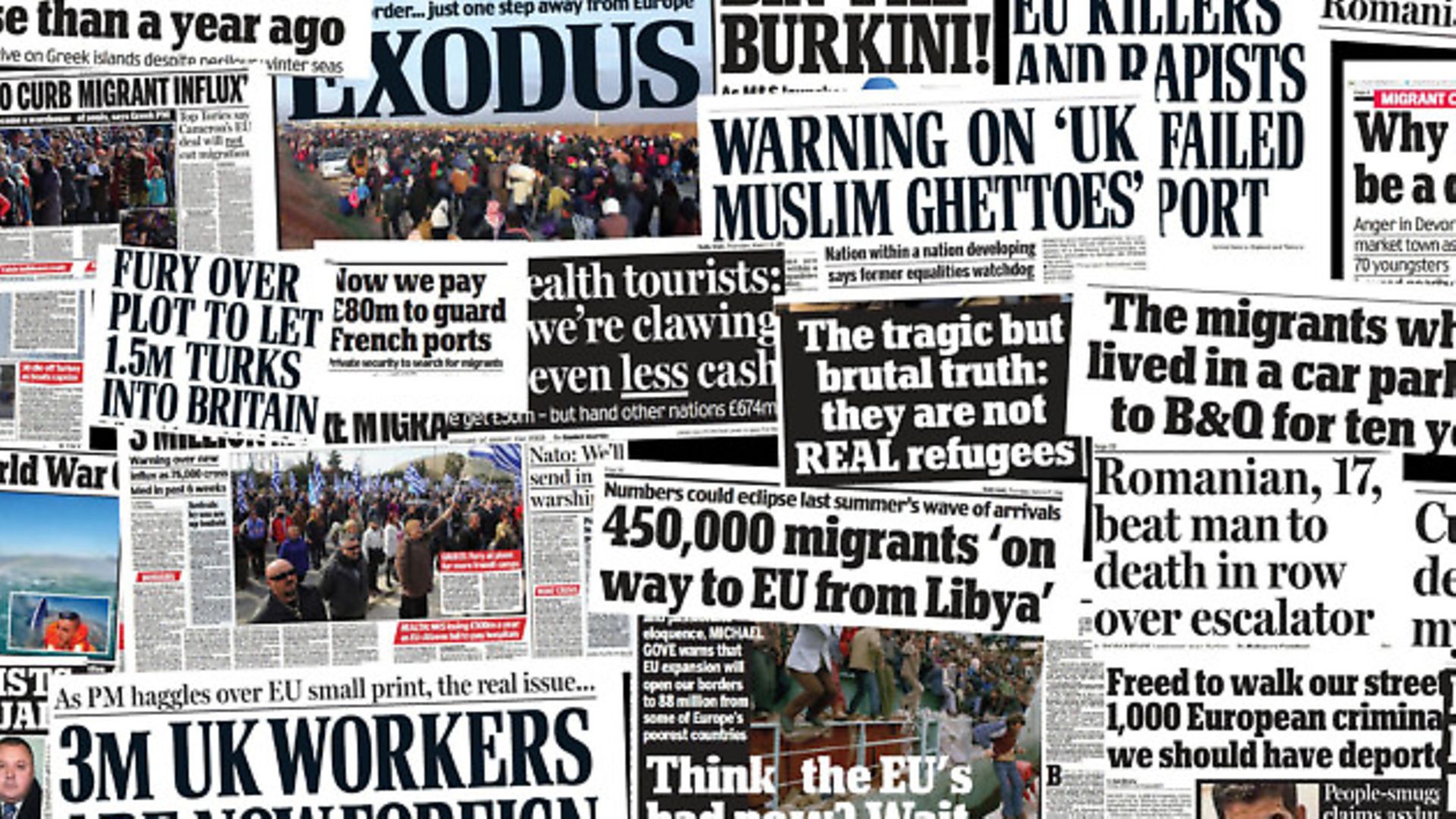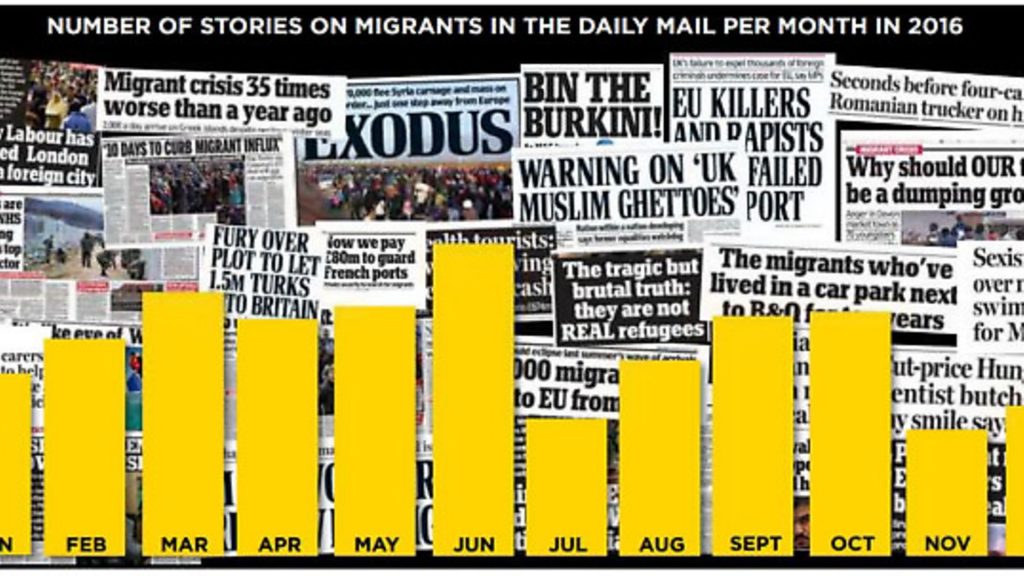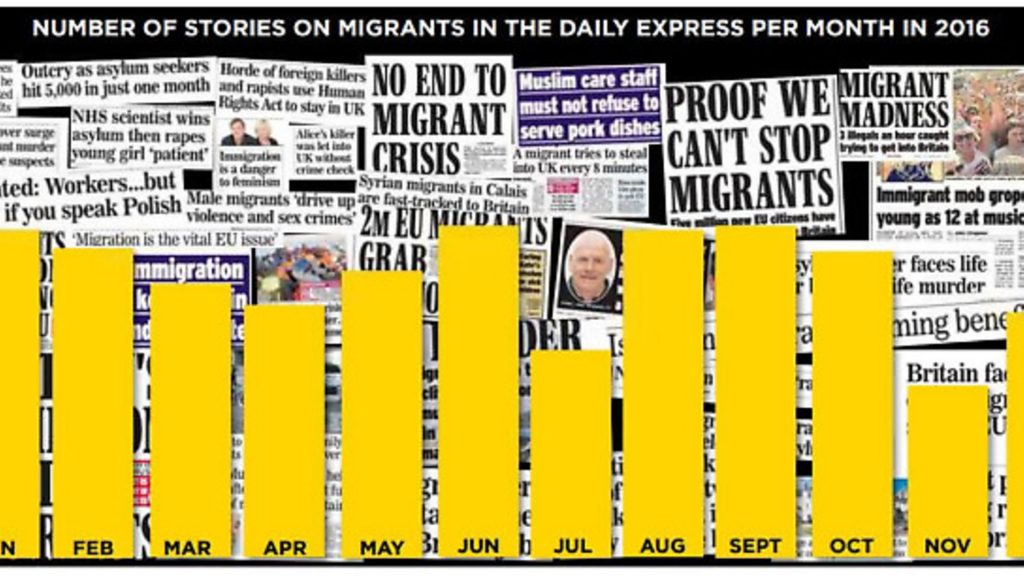
Immigration was, by most accounts, the deciding factor in the EU referendum. Warnings about the economy, promises of £350m for the health service, even bendy bananas played their part. But nothing pushed the voters’ buttons as much as the idea of more people landing on our shores.

Pro-Brexit newspapers recognised as much, and fed and nourished their concerns – and have continued to do so in the push towards Article 50. Are they being responsible, telling voters what they need to know or abusing vulnerable people to secure the outcome they want? When does legitimate campaigning become a vendetta? Where and who draws the line on what is acceptable?
Last September, this newspaper published an analysis of ‘the real Project Fear’, which looked at the prevalence and tone of anti-immigration stories on the front of Fleet Street newspapers. At the time there were 195.
By the end of the year, there were 277, with more than half coming from two newspapers – the Daily Mail and the Daily Express. That original study dealt only with lead stories relating to immigration. Now I have examined all of last year’s coverage of immigration, race relations and the treatment of foreigners (with some exceptions, detailed in the panel) by those two papers.
Between them, they printed 1,768 pages that included at least one such story, making an average of more than three per issue for the Mail and two for the Express (which has far fewer news pages). If every page were laid side by side, they would stretch for a third of a mile. The Sun, which is every bit as hostile but came a distant third in the page one league with 23, averaged one per issue.

With the exception of Afghan interpreters and some elderly white South African women facing deportation, the coverage was overwhelmingly negative, rising through the spring to a peak just before the referendum (six pages in the Mail, five in the Express on the day before polling). It then fell away sharply, apart from a spike when the first child refugees arrived from Calais and the Jungle was dismantled.
‘Scandals’ included foreign crooks we could not deport, women putting intolerable strain on the health service by giving birth, children cramming into overcrowded schools. Then there were side issues such as burkinis and an insistence that anyone coming here should learn the language first (imagine the outcry if France demanded that Mail readers spoke French before buying their bargain chateau in Provence).
Europe was held to blame for many of these problems, even though fewer than half of the immigrants who arrived last year came from the EU. Great play was made of the pressures on the health service – and on the threats to patient safety posed by foreign doctors – but not of the contribution to the NHS of the 130,000 foreign staff who work for it. (Neither paper reported last month’s ‘One day without us’ day of action to celebrate immigrants’ contribution to British life.)
The vast majority of the stories examined were about the sheer scale of immigration and the structural and political fallout of coping with so many people. Politicians and campaigners with an outrageous number to publicise had no difficulty in finding reporters with open notebooks and pencils at the ready. Further ammunition came from across Europe, especially Germany, where Angela Merkel’s discomfiture is regarded as deserved retribution for the folly of her open-arms policy towards refugees.
The Express does not greatly trouble itself with world news – apart from the rise of Donald Trump – and its readers may be unfamiliar with what is going on in Aleppo or Mosul. But they know all about gang rapes and rioting in Swedish asylum centres.
The Mail is equally sceptical about many of the people making their way through Africa and Europe to Calais, but it has at least sent writers to report in some depth about the situation in Syria, Libya and across the EU and about the plight of those caught up in wars for which the West bears some responsibility. The Express, which is far more strapped for cash, relies almost exclusively on agency copy and ad-hoc stringer freelances.
Between a quarter and a third of the articles dealt with other related issues, such as Muslim integration, health tourism and crime. Crime dominated, with particular emphasis on murder, rape and other sexual assaults. In almost every instance, the ‘outsider’ was the perpetrator.
Only three killings were reported where the victim was a member of a minority – and in two of those, the attacker was Muslim. In March the Mail mourned shopkeeper Asad Shah in a splash headlined ‘Murder of a man of peace’. Shah had wished his Christian neighbours a happy Easter and had been stabbed 30 times by a fellow Muslim for ‘disrespecting Islam’. The Express reported the story on page 10. The bludgeoning to death of an imam by an ISIS fanatic was given rather less space.
The third victim was Arkadiusz Jó?wik, who was killed in Harlow in August. The Sun led on the story under the headline ‘Killed for being Polish’. The Mail put it on page 23. The Express did not run the story, but the next day it told readers about a ‘no-go area’ after ‘race killing’.
Both papers noted a rise in the number of anti-Semitic attacks [quite apart from extensive coverage of the Labour party’s travails, which were not counted in this exercise] and carried news stories on about a dozen occasions. Less well-documented were statistics pointing to a post-referendum surge in hate crimes against other groups. The Mail managed two two-paragraph stories – and a double-page spread by Guy Adams rubbishing the idea that there had been any increase.
In January, Andrew Norfolk described in the Times how asylum-seekers in Middlesbrough were being accommodated in houses whose doors were all painted red, a situation that made them sitting ducks for racist attacks. It was followed up everywhere, including by the Express and the Mail, which said it had chilling echoes of Nazi Germany. The day after that, the Mail devoted a page to ‘the other victims of red door apartheid’.
These were members of the local white population who were unhappy that so many people had been sent to their area – one of the poorest in the country – and that they were being branded racist. It is a good piece.
A few days later the Guardian reported that asylum-seekers in Cardiff were being required to wear brightly coloured wristbands at all times. Again, both the Express and Mail followed up, but this time it was the Express that came back with the ‘balance’: a comment page piece by Jonathan Foreman who described it as a ‘bogus scandal’ demonstrating refugees’ ‘exalted sense of entitlement’.
It may appear that ‘balance’ is offered only when the original material shows the minority group at a disadvantage, and that perception is reinforced by the attitude towards the existing Muslim community.
Stories abound about burkas, sharia law, segregated swimming lessons and a general failure to adopt ‘British’ ways; indeed some people are said to be so isolated that they believe the UK to be an Islamic nation – even though Muslims make up less than 5% of the population. There is good copy to be had from school bus drivers stopping making the children on board wait while they pray at the roadside, or from exams being held early so that pupils fasting for Ramadan are not disadvantaged. But is it enlightening?
Where are the stories about the need for white Britons to offer a welcome – or about places where diverse groups rub along happily? The Express offered ‘Cosmopolitan Street’, which was fairly positive about 23 different nationalities living in one shopping parade (the Mail managed 28), but it paid much more attention to its two candidates for ‘the most segregated town in Britain’ (Boston in February, Blackburn in November).
Neither it nor the Mail would contemplate commissioning a piece such as that by Simon de Bruxelles in the Times last month on projects around the country aimed at making the few child refugees accepted into Britain feel at home.
And where are the heroes from minority groups? They are there – the newsagent who rescued a teenager from a knife attacker, the woman who took the full force of an out-of-control car to save her grandchildren. But we are left to guess their backgrounds from their names because race and religion shouldn’t be mentioned unless germane.
Quite right. But what about the Romanian trucker who caused a pile-up while using his mobile? The Mail has been campaigning for tougher penalties against drivers who can’t put their phones down. Over the past year, a number of people have been killed by such drivers and the newspaper has been assiduous in reporting cases when they have come to court.
But the Romanian didn’t kill anyone. And what had his nationality to do with anything? Barely a week later, Tomasz Kroker was jailed for killing a mother and three children by ploughing into standing traffic while changing the music on his phone. The fact that he was Polish was not mentioned until the seventh paragraph.
Progress? Possibly. Except that the next day the paper’s front page consisted of half a dozen photographs of men fiddling with their phones while driving lorries with overseas number plates – an object lesson in how to turn a valid safety campaign into an attack on foreigners.
Then there are the Albanian killers, the Somali rapists, the knife-wielding Croatian thugs. If all those are justified on public interest grounds because they’ve been ‘let in’ or ‘cannot be deported’, what about the Lithuanian girl who picked some wild mushrooms, the Lithuanian model who did drugs, the Romanian who tried and failed to mug a woman at a cashpoint and the Italian who set off a smoke alarm on a plane?
Let’s pause over that last one: a man heading for Britain (perfectly legally) lit a cigarette and put it out when caught. He didn’t cause the flight to be delayed or diverted, and ended up being fined £250. That is newsworthy enough to make a national newspaper page lead? Yes, if you can put ‘migrant’ in the headline.
And there’s another thing. The man in question had a job. Britons who turn up in court are generally described by their occupation, but foreigners never seem to be carpenters or teachers or shop assistants. They are ‘migrants’ or ‘asylum-seekers’ or identified by their country of birth.
Newspapers must be free to exercise news judgment, to determine what is most important, what will most interest their readers, but those that elect to be regulated by the Independent Press Standards Organisation – as both the Mail and the Express do – are expected to abide by the Editors’ Code.
Clause 12 of the code says that the Press should avoid ‘prejudicial reference’ to an individual’s race, colour, religion, gender, sexual orientation, illness or disability, adding that such details must be avoided unless ‘genuinely relevant’.
The problem with this clause is that only the person being written about can complain. There is no provision for people to protest about discrimination against groups or whole sections of society. That is why complaints against Katie Hopkins’s notorious ‘cockroaches’ column were rejected.
Citizens UK, which works with communities and helps refugees to settle here, has been greatly concerned about the coverage of minorities and has asked Sir Alan Moses, chairman of press regulator Ipso, to set up an investigation. Last month it held its second meeting with Sir Alan, presenting him with dozens of front pages, leaders and opinion columns showing immigrants in a negative light.
Sir Alan is not happy with the tone of some of some newspapers’ reporting and has said as much publicly more than once. On this occasion he described the material on the table as ‘a mass of disparaging reporting all mixed up into a general prejudicial picture’, but he added: ‘This is where it gets really difficult. We cannot investigate a whole series of reports just because they are prejudicial. The police can, but they are feeble. The [hate crime] legislation doesn’t require intention to be proved. But they don’t bother.’
As to Ipso’s capacity to respond, he said: ‘There is no rule that requires the Press to avoid prejudice. How do you draft such a rule?’ The public were continuing to absorb deliberately prejudicial stories and subtle references to religion when not relevant, he said, and those disseminating them needed to be confronted. But the editors’ code, as it stood, left him powerless to rein papers in.
‘I am incredibly conscious of the disappointment I almost daily cause to you and your colleagues. I am frustrated and ashamed, but that won’t make me give up,’ he added.
Following on from Sir Alan’s suggestion that the police were in a better position to do something, the Police Chiefs’ National Council was invited to comment on whether forces felt able – or were minded – to act against newspapers. The response was to send a copy of the 140-page guidance on the law and to say that it was down to the Crown Prosecution Service to make decisions on a case-by-case basis.
Citizens UK has taken heart from Ipso’s willingness to discuss the issue, but there was anger and frustration after last month’s meeting at the apparent reluctance to launch an inquiry – it can do so without any formal complaint, if it believes an issue to be serious enough. The group is now compiling a detailed report at Sir Alan’s request and has also recruited a small team to monitor newspapers and submit complaints under the existing procedure.
Miqdaad Versi, assistant secretary general of the Muslim Council, is already doing that – in the same way that InFacts did with referendum coverage – and has secured 19 corrections and apologies over the past three months.
He is also frustrated by Ipso’s call for more evidence before it can take matters further. ‘For Ipso to gain greater confidence of communities, three key changes are needed: a stronger willingness to investigate the consistent breach of basic standards by national newspapers, equal prominence for corrections and a stronger code that reflects the recommendations of Lord Leveson’s inquiry.’
Versi is less sure about police action, saying that it would have to be the right case to have a chance of success, while the wrong one might undermine public support for law against racial hatred.
Elsewhere, Stop Funding Hate, which wants advertisers to abandon papers that ‘demonise’ sections of society, scored a big hit last month with the Body Shop’s announcement that it would no longer advertise in the Mail.
A momentum is slowly building. The SFH campaign is a tricky one in terms of censorship and free speech, but it is being heard. And loudly enough for the Mail to take a swipe at it in a recent leader, describing the group as malicious left-wingers trying to bully and blackmail firms.
The main target of that leader was Section 40, a law that might force newspapers not signed up to a state-approved regulator to pay both sides’ costs in any court action, win or lose. Ipso – to which most papers, including this one, are signed up – is not a ‘recognised’ regulator.
A public consultation on whether ministers should enforce the statute closed in January. In the final weeks, most national newspapers ran leaders urging readers to defend the free Press. The Mail also carried full-page adverts almost daily to hammer the message home.
As it happens, there is another consultation process coming to a close relating to Press regulation – one that has received far less, if any, publicity. The Editors’ Code, which was put together by a committee under the chairmanship of Mail editor Paul Dacre, is being reviewed and the public are invited to make submissions on how it might be improved. The closing date is today, March 3.
It’s not an easy task: some people might look at the sort of coverage detailed above and say ‘something should be done’, but what? Papers have to be free to campaign, so repeatedly returning to the same issue has to be acceptable. Who is to say how often is too often? News editors are aware that readers tire of the same old, same old and ease up before people turn off. But, far from tiring of these immigration stories, readers are actively encouraging them – just look at the below-the-line comments on any website. It’s a vicious circle.
The Mail and Express may also reasonably point to successive opinion polls suggesting that immigration is a prime concern across the country. Successive opinion polls support that view. In its latest ‘issues that concern voters’ survey, Ipsos-Mori found that 18% of interviewees mentioned immigration, compared with 39% for the top issue – the EU – and 32% the NHS.
Worries about immigration hit their highest point of the year in June, when it was mentioned by 48% of those questioned. That same month people went to the polls to decide whether Britain should stay in or leave the EU. We all know how that vote was split…. And exactly what the Mail and Express think about the concerns of that 48%.
Liz Gerard worked on national newspapers for 40 years. She now blogs on Fleet Street’s output at www.sub-scribe.co.uk and was last year named Editorial Intelligence’s media commentator of the year










